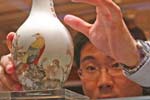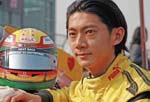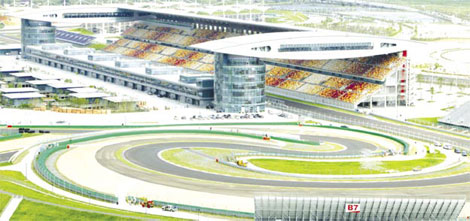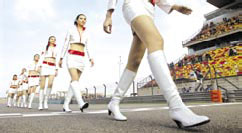Business
F1 sponsors expect lucrative returns
Updated: 2011-04-11 11:12
By Matt Hodges (China Daily)
|
An aerial view of the Shanghai International Circuit, which has hosted the Chinese F1 Grand Prix since 2004. Provided to China Daily |
SHANGHAI - So what if people aren't queuing up to watch the typically rain-soaked Chinese Grand Prix anymore, or if the closest thing to a Chinese Formula One star is a German who goes by the name of Michael Schumacher? The sport is still considered a huge money-spinner by sponsors like UBS, Allianz and Hublot, as they burrow deeper into the Chinese market with their respective messages of wiser wealth management, better road safety and the importance for China's nouveau riche of owning an expensive Swiss wristwatch.
"We started our activities in the Chinese market with Formula 1," said Jean-Claude Biver, CEO of the LVMH-owned Swiss watchmaker Hublot. The sexagenarian apparently does not foresee any end to the company's growth in status-conscious China during his lifetime, or for the next 60 years. "We really believe that most of our potential customers are interested in Formula One, and we are convinced that F1 is the best way to meet with them and communicate our brand," he said, adding that "the Chinese customer is more brand sensitive than most".
Biver personally launched a new F1 watch at last year's Chinese Grand Prix, which has been hosted in Shanghai since 2004. On its debut, attendance over the course of three days stood at 270,000 people. Then the numbers fell off to settle at 120,000 in 2009. Thanks to the reappearance last year of racing legend Schumacher, gate receipts gained some traction to total 155,000 - but the novelty factor of F1 for many Chinese had already evaporated.
Promoters are hoping to fill the stands this year by slashing ticket prices for the April 14-17 race by 40 percent, meaning that the cheapest one-day ticket now costs 80 yuan ($12).
"We're not worried about this decline. We think it's normal. In the first year, people came from all around because they wanted to see something they had never seen before. Now it's die-hard fans only," said Patrick Yang, managing director of Juss Event Management, a State-owned company and the organizer. He estimates that 70-80 percent of last year's visitors were Shanghai locals, a much higher proportion than in the first few years.
"We only started getting involved in F1 seven years ago, compared to the 1950s for many other countries. China has just started developing its car market. For example, we don't have this trend of people customizing their cars yet," he said.
"We don't need as much time as it took in the West to develop an F1 culture, but we still need time to go through this process."
|
Grid girls walk on the track after the qualifying session of the 2010 Chinese F1 Grand Prix. Jason Lee / Reuters |
Chinese F1 spectators tend to be younger than their Western counterparts, which is something sponsors should be aware of. Yang puts the age bracket in China at 20-45, meaning students and white collars instead of senior executives and retirees.
"Our fans are younger," he said. "When our parents' generation was young, their biggest priority wasn't motor sports. It was making sure there was enough food to eat."
China also lacks a Chinese racing star. Netherlands-born Tung Ho-pin, one of a handful of test drivers for Renault F1, probably ranks as the closest thing at present.
In contrast, tennis has boomed in China over the last decade, built on the back of female players like Zheng Jie and Li Na sweeping trophies and making Grand Slam finals. As far back as 2005, Shanghai, which also hosts the Rolex Masters in October, had an official "tennis population" of 500,000, referring to people who play recreationally at least once or twice a week.
Specials

Share your China stories!
Foreign readers are invited to share your China stories.

Art auctions
China accounted for 33% of global fine art sales.

Waiting for drivers' seat
Lack of sponsorship appears to be why Chinese drivers have yet to race in a Formula 1 event

